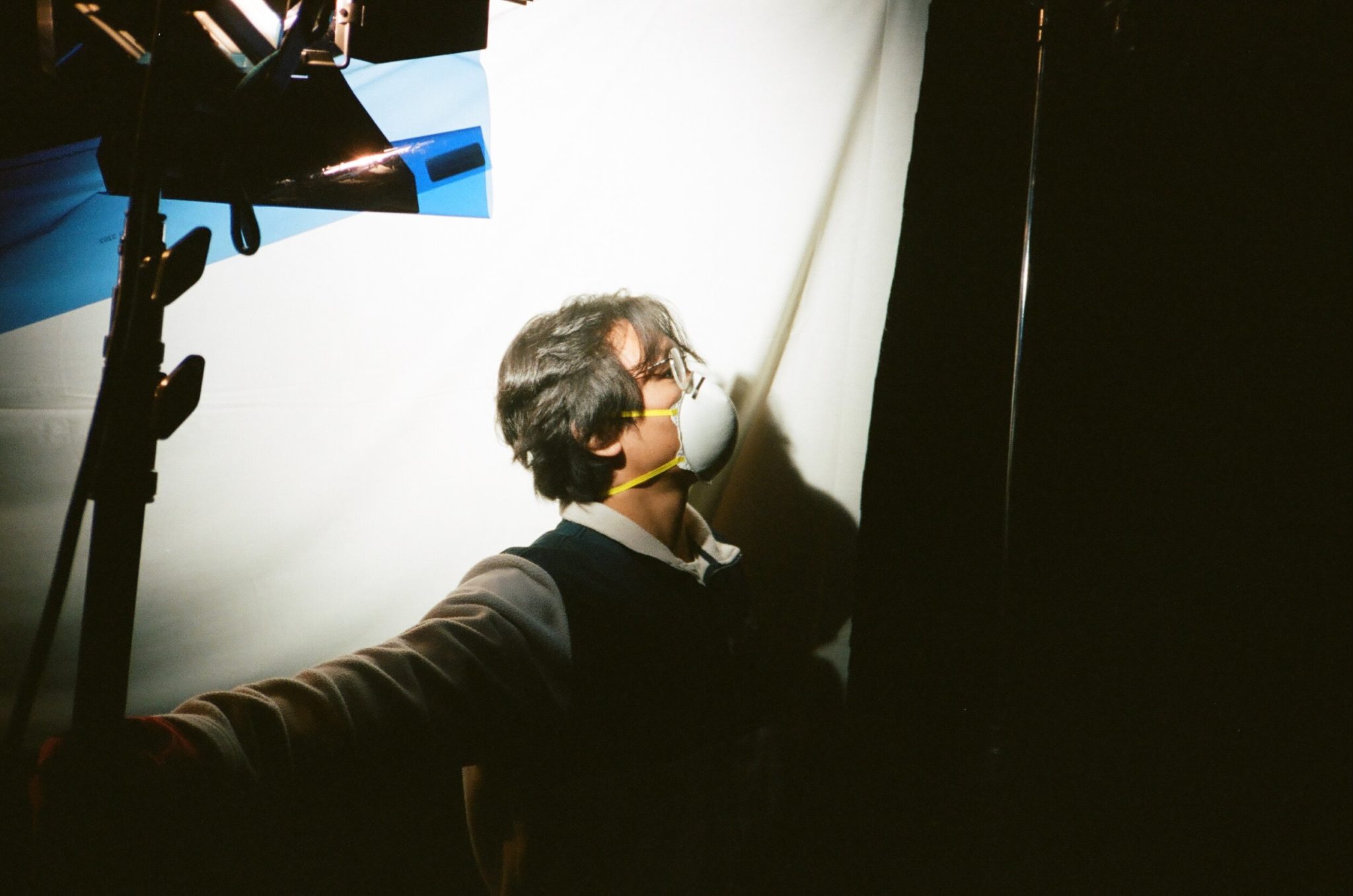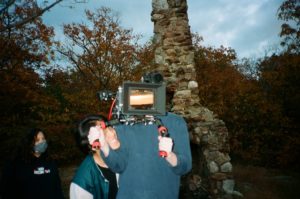
Annelise Ratner
Throughout spring 2020, multiple strangers received a curious message. “Come to my house and make films.” Excited by the idea of taking time off from school and being able to freely make movies, six strangers agreed to join the sender, Charlie Gleberman ’23. Thus, the Foothills Film Collective was born.
“When it was announced that we weren’t going back to in-person classes last fall, I was like, ‘Zoom school sounds kind of bad,’” Gleberman said. “Someone had talked to me already about getting a group together to do short films. He dropped that and went back to school ironically, but I started reaching out to people and seeing who would be interested.” Connected mainly by the common interest in film, many of their curiosities peaked. The strangers, some of whom had only previously met one or two times and some never at all, had a lot to consider. “All of these wonderful people said they’d be at least interested.”
“I think a lot of the convincing [had to do] with COVID,” Annelise Ratner ’23, a member of Foothills said. “The thing is, most of us didn’t know each other. And we’re like, ‘Ah, living with a bunch of strangers. There’s this new pandemic that we don’t know much about.’ We wondered, ‘how do we stay safe?’”
True, more generally, COVID-19 caused a lot of health and safety concerns, something that stifled film production internationally. However, these safety concerns aside, some students decided to take COVID-19 as an opportunity to create more films, and the Foothills worked towards being COVID-19 conscious.
While the group’s first semester, fall 2020, was less organized, by the second semester, spring 2021, they had better adjusted to COVID-19 and found themselves more structured, including the extension of their production timelines to include two weeks of quarantine where each member could write a script. The second season also came with the addition of a member, Pablo Causa ’24. This increase in organization and an additional member boosted their productivity, with the number of short films produced increasing from the four they filmed in semester one to six filmed in semester two. The films range in theme and genre, from the post-apocalyptic film “End of Days” to a story of “drug-impared” brothers mending their relationship on a camping trip in “The Kindling.”
“When you’re living with each other, you’re working together constantly on all these projects in a very concentrated amount of time,” Ratner said. “I think we all picked up on each other’s skills a lot. At least for me, I came up with feeling much more well rounded in my abilities.”
According to Annaelise Kennedy ’24, president of Yale Cinematic Productions, or the Cinemat, those skills have made them valuable assets to the Yale community. The Yale Cinemat is a film organization meant to introduce students to the film community at Yale and to facilitate film production on campus.
Previously, the University has seen many film clubs and organizations with similar goals. Bulldog Productions, founded in 2003, was Yale’s student-run film production house, which has since largely died off. Since 2015, the Yale Student Film Festival has displayed the work of university-level filmmakers, both at Yale and elsewhere.
However, this school year, the Cinemat is running a series of introductory workshops called Bulldog Productions — named after the defunct group — where they work with Foothills to actually spread technical knowledge on campus.
“With the Cinemat workshops, it’s cool to see recurring faces come again and again,” Ratner said. “I think people are getting a lot out of it, even though sometimes not that many people come.”
According to Gleberman, though unpolished, these workshops help supplement Yale film production classes, which have a limited enrollment due to COVID-19 restrictions. Each workshop covers a different film production skill, but feedback from the meetings has implied the condensed structure to be overwhelming.
“We’re trying to contend with [limited enrollment], but also do it as an extracurricular thing,” Gleberman said. “It’s just hard to try and fit in as much stuff as we feel like would be really helpful to people in the limited amount of time and with the limited resources we have.”

Film at Yale is not as specialized as other universities. Film oriented schools like University of California, Los Angeles or New York University provide wide ranges of production experience through classes. Yale differs. “Something that is kind of lacking in the film and media studies major is more technical skills, which makes sense,” Kennedy said. “A lot of the major is writing papers and things like that. But for people who want to do production stuff, there’s not a ton of opportunities on campus.”
For example, Kennedy said that she is glad to have learned how to do things like write screenplays in film studies classes. However, Kennedy and Sophia Hall ’23, a third member of Foothills, are theater studies majors. Alan Lin ’24, another member of Foothills, is an English major. And Gleberman is an art major.
Soleil Singh ’24, a film and media studies major, said that many people take different tracts to gain access to film production while at Yale while here at Yale, including things like majoring in American studies with a concentration in film. Kennedy is another example: though she is a theater studies major she says that she might complete a film for her senior thesis.
However, according to Kennedy, prior to the Cinemat, nonfilm majors and those who were not personally connected to the student film community had a hard time getting into film at Yale.
“We wanted to just make it more out in the open and easy access for anybody who is interested but didn’t know anyone personally,” Kennedy said.
The Cinemat’s role in fostering this access is important for students trying to break into the film industry, as it is largely based on connections, Kennedy explained.
“People ask their friends to work with them, even when it comes to the professional world,” Emily Rodriguez ’22, a Foothills member, said. “They want to know who is involved and they want to know what they are getting themselves into.” One of the Cinemat’s main goals then, according to Kennedy, is to help people develop these collegiate connections.
Derek Webster, senior associate director for creative careers and specialty advisor for the Yale in Hollywood Summer Internship Program, emphasizes the importance of students making “on the ground” connections while facilitating their own interests. The program is supported by an alumni group involved in the entertainment industry and who are part of the Yale Club of Southern California. They offer internship opportunities and streamline the internship search process for students who want internships in entertainment.
“[Students] should be engaging with professionals, probably starting from alumni,” Webster said. “On a regular basis, you should be reaching out and connecting through the Yale alumni association and things like Cross Campus, [the University’s online networking program] and the Yale in Hollywood program, which posts positions coming through alumni channels.”

Connections are becoming easier to make as organizations like the Yale Film Alliance, or YFA, open up. The YFA is an umbrella organization — not a club — that oversees independent film clubs including the Cinemat along with the old Bulldog Productions, the Screenwriting Syndicate, the Yale Film Society and the Yale Student Film Festival.
“We are able to bring the film communities from all of the different clubs together. So we’ll host parties for the YFA that everyone’s invited to. We host social events and dinners. We’ve had a couple of movie outings where we’ll go to the theater in New Haven altogether. And because we’re not a club, we can bring from all these disparate parts of the filmmaking community together,” Julia Arancio ’23 said.
Arancio is a co-president of the YFA with Jake Jorgl ’23. She said that they have worked very hard to rebuild the YFA “from scratch.”
“It’s our job to create this new system and this new kind of club and this new order, but it’s also our job to make sure that it stays,” Arancio said. “And so in the coming semester we’re going to be thinking about board applications and passing that on. Hopefully, we have this new group of freshmen and also sophomores who never really saw the film club in the past year or two. And so now this is all they know of film at Yale.”
Both Arancio and Kennedy share a goal of stabilizing the Yale film community on more solid and permanent ground coming out of the pandemic, with hopes of developing a proper network to advance filmmaking Yalies.
“I think the risk that you run with something like the Cinemat though is that Annaelise is doing a great job, but she’s going to graduate,” Ryan Zhou, a member of Foothills said. “Maybe I am just a pessimist, but I think likely when she graduates the ship’s going to sink. I mean, who knows? Maybe the Cinemat becomes this really big production thing at Yale, and it becomes the thing that survives all of this. But I feel like stuff like the Cinemat has definitely been tried before, and it probably failed because people graduate.”
Zhou’s point is especially prescient considering the shortcomings of the continuation of film clubs in the past. Looking at Bulldog Productions, it is not hard to see how prominent film organizations on campus might fail in the future.
“But for now it’s creating a community, and that’s what will survive,” Zhou continued. “First years will find people and through those people they will find other people and hopefully that just keeps rebounding and rebounding and networks grow. The best thing though is there will always be people at Yale who want to make films, and so you just have to be willing to put your time and effort into something that isn’t your own so that you can learn to better make your own. Regardless if the film community exists, I think film can exist and thrive.”







